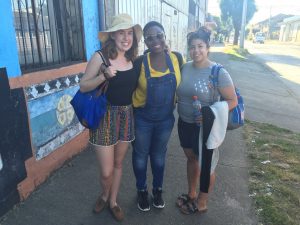J-Term Practica, 2016
Income Poor, but Asset Rich; A Strong Sense of Community in La Victoria
March 7, 2016

Social exclusion in Chile is visible in a blatant way with the Mapuche, but beyond the marginalization of this indigenous population we grew to know, lies the isolated community of La Victoria in Santiago, Chile. This semester at MIIS, I’ve come to understand the multiple dimensions that encompass poverty and one of these many dimensions is isolation. The small, independent and self-sustaining community of La Victoria, that we were given a tour of in
Santiago was a perfect illustration of this. Their story begins with a plot of unsettled land, an area where the wastewater of southern Santiago collects. In 1957, there were over 2,000 families, packed along the canal. They found themselves without an adequate place to live, no electricity, or drinkable water, and struggling to survive under the governance of an ineffective state. After unsuccessful attempts of turning to the government for 1 assistance, they
decided to come together in solidarity to construct their own shantylike
homes, made of modest and available materials, and essentially provided for themselves where their government failed to in terms of basic social services like garbage and electricity.
Later on in the 1980’s, under the dictatorship of Pinochet, they became known as a resistance community. It was a time filled with protests, firefights, and deaths for the leftist antiPinochet community, including that of the French priest Father Andre Jarlan. Over time, their sense of community and solidarity did not dissipate but only grew stronger despite being ruled by a fascist government.
Today La Victoria runs its own independent television and news station called Se ñal 3. More than that, they are almost entirely self-sustaining. They have their own electricians that have fabricated their own electrical system for the community and so on. It’s a place where everybody knows everybody and if you need anything sugar, eggs, milk, or tools, you can just ask your neighbor. Where they may fall short in income and earnings, they make up for it in
other types of assets such as their depth of social capital, ingenuity, and innovation. The government continues to exclude them and in 2002, declared them as a zone of “critical delinquency,” due to the drug trafficking activity that takes place within the zone2. During our visit to the community, we were told that if you go into the city and apply for a job with an address coming from La Victoria, nobody will hire you. Because its residents find difficulty in gaining employment in the formal sector, they are left to do so in the informal sector, only perpetuating their economic status. How can a population escape the cycle of poverty in the face of discrimination and other added barriers along the way? Whether La Victoria rises out of their current economic status or not, it is certain that their resilience and solidarity will continue and allow them to prosper in other ways aside from wealth.



You must be logged in to post a comment.